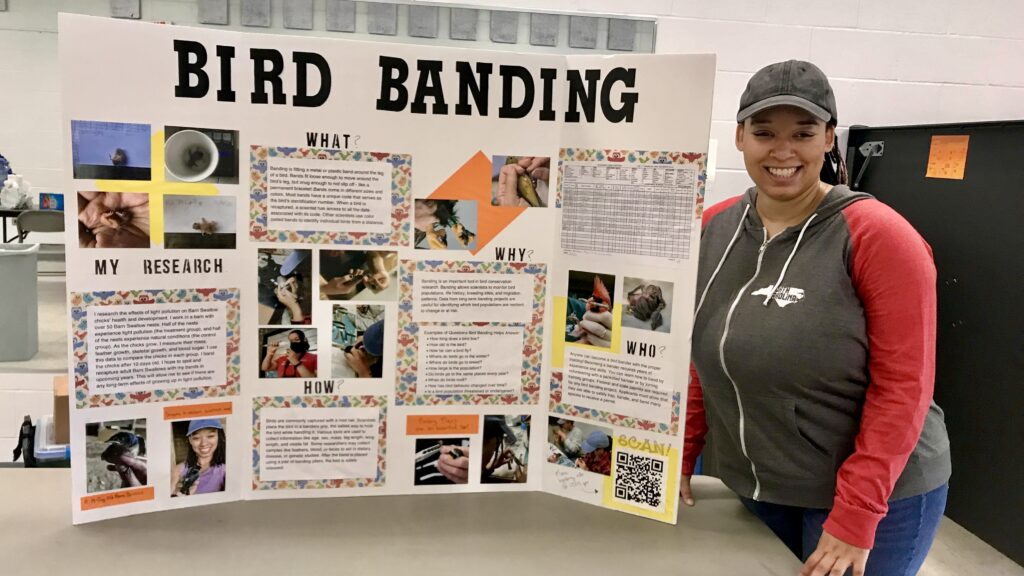Researcher Spotlight – Murry Burgess

2022 Global Change Fellow
PhD Student, Department of Forestry and Environmental Resources
Advisor: Dr. Caren Cooper
Every year the Southeast Climate Adaptation Science Center funds a multi-disciplinary cohort of Global Change Fellows representing colleges across NC State University. Here are some highlights about 2022-23 Fellow, Murry Burgess and the applied research she’s conducting.
About You
What do you study?
I study urban ecology and ornithology. My current research focuses on the impacts of sensory pollutants, such as light and noise, on songbird nestlings. Since 2020, I’ve been conducting a field experiment testing the effects of light pollution on Barn Swallow nestlings’ metabolic health and physical development. I also study, and practice, public science. I’m interested in identifying and breaking barriers that keep underrepresented groups from engaging in natural sciences.
What (or who) influenced you to go into this field of study?
I had no interest in birds until I took an ornithology class in undergrad. Weekly field ID quizzes inspired my love of bird watching. I knew I was hooked on avian research when we learned about mist netting. I got to watch birds be captured, banded, and released. The first bird I ever held was a ruby-crowned kinglet, and I was amazed at how something so tiny and cute could be so powerful!
What are three words your friends would use to describe you?
My friends would describe me as Driven, Resilient, and Inspiring. Besides being a graduate student and Global Change Fellow, I am a children’s author, environmental educator, and co-founder and CEO of a nonprofit. With all my work, I strive to inspire the next generation of scientists and naturalists and leave the natural science field better than how I found it. Sometimes my tasks seem monumental, but so far, I’ve managed to accomplish everything I’ve needed to do. (And I have such amazing friends who keep me going!)
About Your Research

What results are you finding?
So far, results show that barn swallow nestlings growing up in light pollution nests have higher blood glucose, lower mass, and fledge the nest faster compared to nestlings in control nests. Artificial light is perceived as a source of stress, which triggers a “fight or flight” response fueled by glucose. Just like in humans, high blood glucose is a risk factor for metabolic diseases, such as avian diabetes. In addition, light pollution could be causing trade-offs in nestling development between mass and feather growth; nestlings may channel nutrients toward feather growth instead of muscle mass so that they can get away from the stress faster. I’m excited to explore what, if any, long-term effects exposure to light pollution might have past the nestling-to-fledgling development period.
Who will benefit from your research?
My research will help inform sustainable lighting choices in cities, so I hope that both birds and humans will benefit. As more of the world’s population lives in urban areas, it’s important to understand how light pollution affects all organisms. Birds can act as a “canary in a coal mine” for the condition of human health and development in light pollution.
How would you describe your research to a 3rd grader?
I run a doctor’s office for birds! I compare the chicks who grow up with artificial lights on all night to the chicks that sleep in darkness. I record their growth by taking their weight and measuring how fast their wings, legs, bill, and head are growing. I also take a tiny drop of blood to check their blood sugar. This will tell me if the artificial light is stressful for the chicks. Because artificial lights are everywhere, I want to know if chicks growing up in it can still be normal and healthy.
About Your Global Change Fellow Experience
What has been the most rewarding part or your favorite part of being a SE CASC Global Change Fellow?
My favorite part of being a Global Change Fellow is meeting the diversity of people all working toward the same goal. Connecting with professionals in other disciplines is so important for tackling an issue as large as climate change, as well as for challenging me to think outside the box on my own research.
What advice would you give to a student that is interested in getting involved in your field?
My advice to anyone interested in my field is to build a support network. Surrounding yourself with friends, family, and mentors to listen to you and advocate for you helps you stay motivated.
What advice would you give to an incoming Global Change Fellow to get the most out of their experience?
My advice to an incoming Global Change Fellow is to make use of the resources you are given. This program provides connections to organizations, professionals, trainings, and engagement opportunities – as well as your fellow cohort members! There’s so much space for creativity and professional development.
Miscellaneous
Is there anything else you want to share?
I’d also like to mention my nonprofit organization, Field Inclusive! I co-founded Field Inclusive during summer 2022 with the goal of amplifying and supporting marginalized and historically excluded field researchers. Field work, or outdoor data collection, is often an essential activity in many natural science fields. However, the outdoors can be an unwelcoming, unsafe place for at-risk individuals, such as racial and ethnic minorities, members of the LGBTQ+ community, and people with disabilities. Field Inclusive seeks to provide field safety resources and training, as well as financial aid for underrepresented field researchers in an attempt to make field work safer and more accessible. Everyone can learn more about and support Field Inclusive by visiting www.fieldinclusive.org and following @FieldInclusive on Instagram and Twitter!
- Categories:
